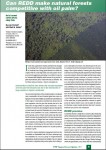1 February 2010: The latest issue of the International Tropical Timber Organization’s (ITTO) newsletter, Tropical Forest Update, includes an article that questions whether payments for reducing emissions from deforestation and forest degradation in developing countries (REDD) can make natural forests competitive with oil palm plantations.
Palm oil plantations, while highly lucrative economically, have replaced large […]
 1 February 2010: The latest issue of the International Tropical Timber Organization’s (ITTO) newsletter, Tropical Forest Update, includes an article that questions whether payments for reducing emissions from deforestation and forest degradation in developing countries (REDD) can make natural forests competitive with oil palm plantations.
1 February 2010: The latest issue of the International Tropical Timber Organization’s (ITTO) newsletter, Tropical Forest Update, includes an article that questions whether payments for reducing emissions from deforestation and forest degradation in developing countries (REDD) can make natural forests competitive with oil palm plantations.
Palm oil plantations, while highly lucrative economically, have replaced large swaths of tropical rainforests in Southeast Asia. The authors, Lian Pin Koh and Rhett A. Butler, note that since REDD carbon credits are currently limited to voluntary markets, such as the Chicago Climate Exchange, they are unlikely to compete financially with oil palm on most types of land. The authors add that if REDD is recognized as a legitimate activity for reducing carbon emissions, REDD credits would be compensated at higher prices through either a UN-sanctioned market mechanism or a global fund, potentially making forest protection an economically competitive land-use option. [The Article]